September 2025
September 10th
August
blew by without a blog post--rare event. But life changing (for
me) events are happening (probably for everyone, for better or worse)...
Several
weeks ago a friend contacted us with an offer of some clay that might
be useful. He mailed me a box and I testfired it. "Wild
clay" is very unpredictable--some will be strongly colored, some will
melt into a puddle at the Cone 8 temperature I fire to. I also
made a test bar for Cone 6, and another friend fired it for me.
There was no puddle, and the clay rang true and was totally
vitrified (not letting water inside it). This was true at both
temperatures.
I told him I'd probably like a dump truck load of
it, and asked what they wanted... He was figuring --a mug for
everyone on the project (which was a large one, or 35 mugs). I
have had to pay for the dump truck loads (so far 2 are delivered, with
possibly two more later). Also the clay was very fragile by itself, so
I added varying amounts of ball clay, which is particularly sticky, and
helps with stretchability of clay. For this project, the clay is
just waste material to be spread out and planted to keep it from
eroding.
Suffice it to say, both sides were happy with the
arrangement, and I offered an additional 35 mugs made from the clay
because of the scheduling trouble the crew goes through to load the
dump trucks. Also a local forest fire diverted the dump truck
driver to supplying heavy equipment for the fire, so the final loads
are on hold...
After trying lesser amounts of ball clay, currently
I'm mixing it with 30 % ball clay. The clay is fairly uniform,
but there are a few rocks, and yellow lumps which I'm sure are yellow
ochre, a hydrated form of iron oxide. At first I tried breaking
up the lumps with a hammer and mixing the two clays when wetted with a
potato masher. Now I'm up to 60 lbs of local clay plus 20 lbs of
ball clay, mixing in one of those clear bushel sized storage bins...
With the hot weather, within a couple days the clay is ready to
use (I put it all through my pugmill to make sure it's uniform...
I
have encountered lumps and vegetable matter and a few rocks, so I'm
moving towards screening it through window screen. I did this
today and it was tedious--took about 45 minutes to get it through the
sieve. I'm considering options like gluing a sieve in the bottom
of a 5 gallon bucket and using a drill mounted mixer to encourage the
slurry through the sieve (which is my process for glaze mixing as well).
I've
got a 6 foot diameter stock tank which I used to make clay 25 years
ago. At that time I used another local Idaho clay, called Helmar
Kaolin, which I could get air floated so there were no rocks or lumps.
I'd like to step the process up to 1000 lb or more batches, but I
need to put a shelter over the tank to keep pine needles and leaves
out, as well as provide shade.
Here's the first dump truck delivery
(
I've just learned a typical dump truck can haul 10 cu. yards of
material, and clay has a weight/yard of 2300 lbs/yard, which could
yield 23,000 lbs of clay!
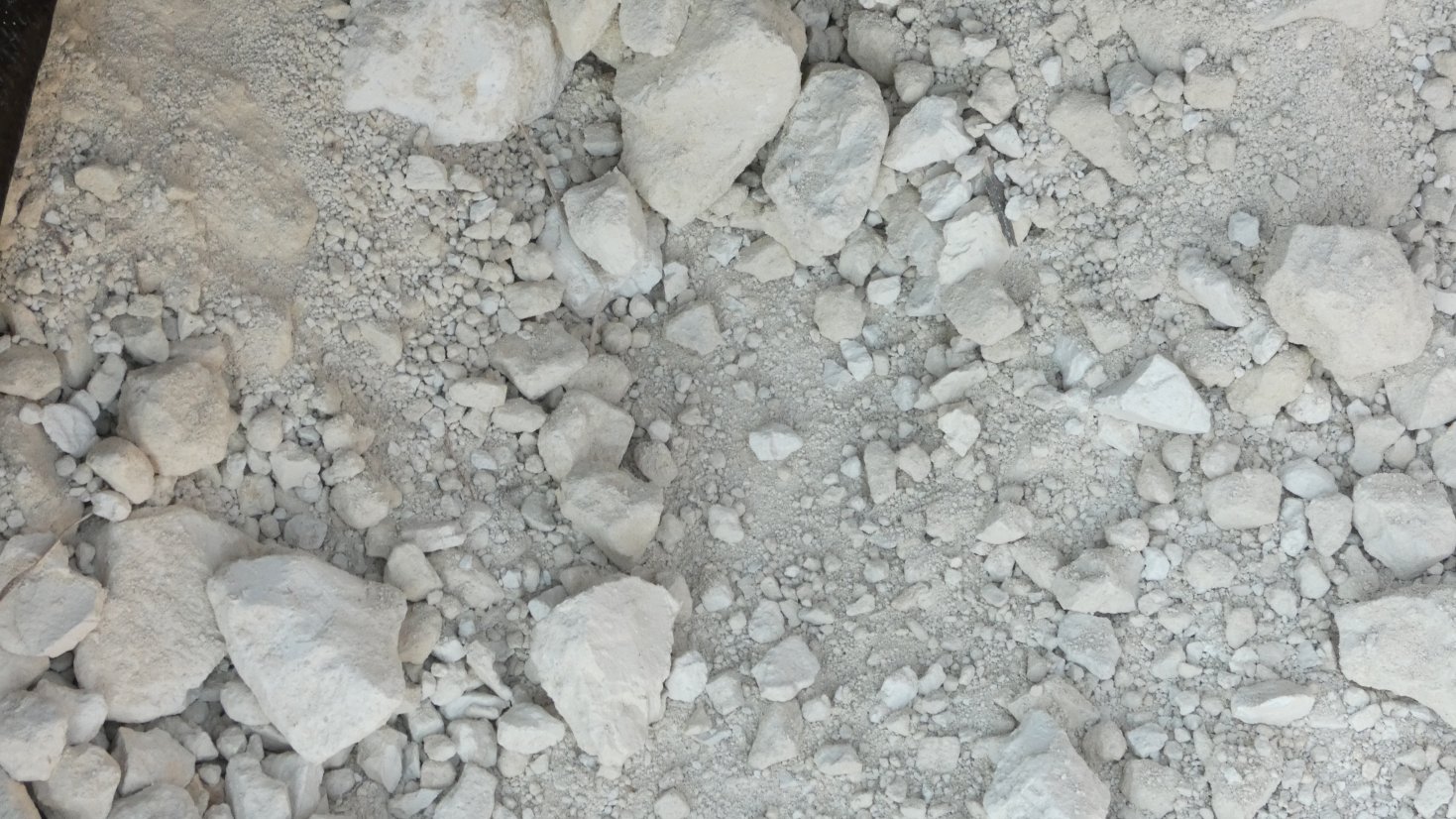
It has been an extremely dry year, and all the clay is bone dry... This is essential for easy mixing with water...
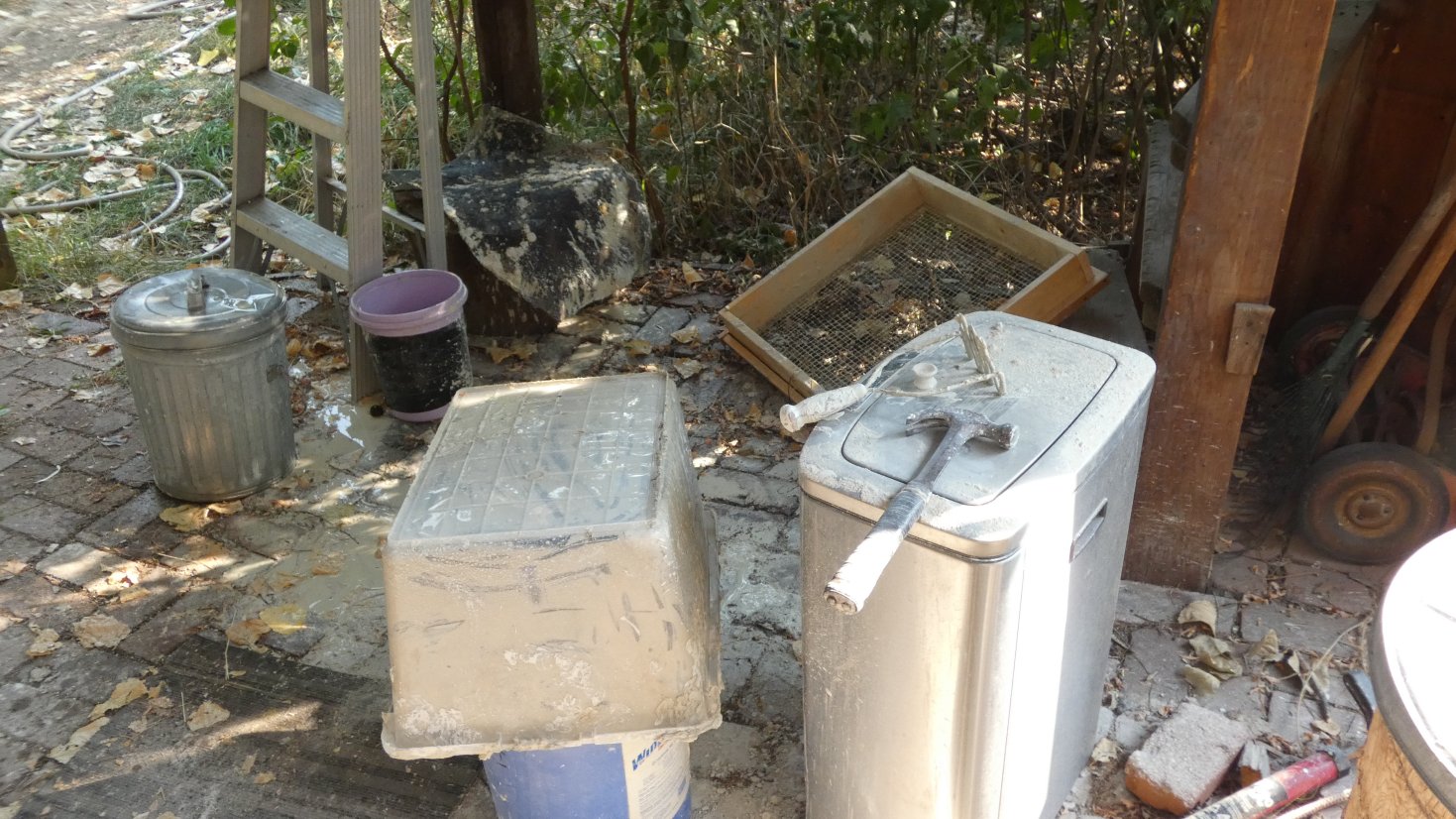
The bin, purple measuring bucket, hammer, and potato masher used to mix the clay
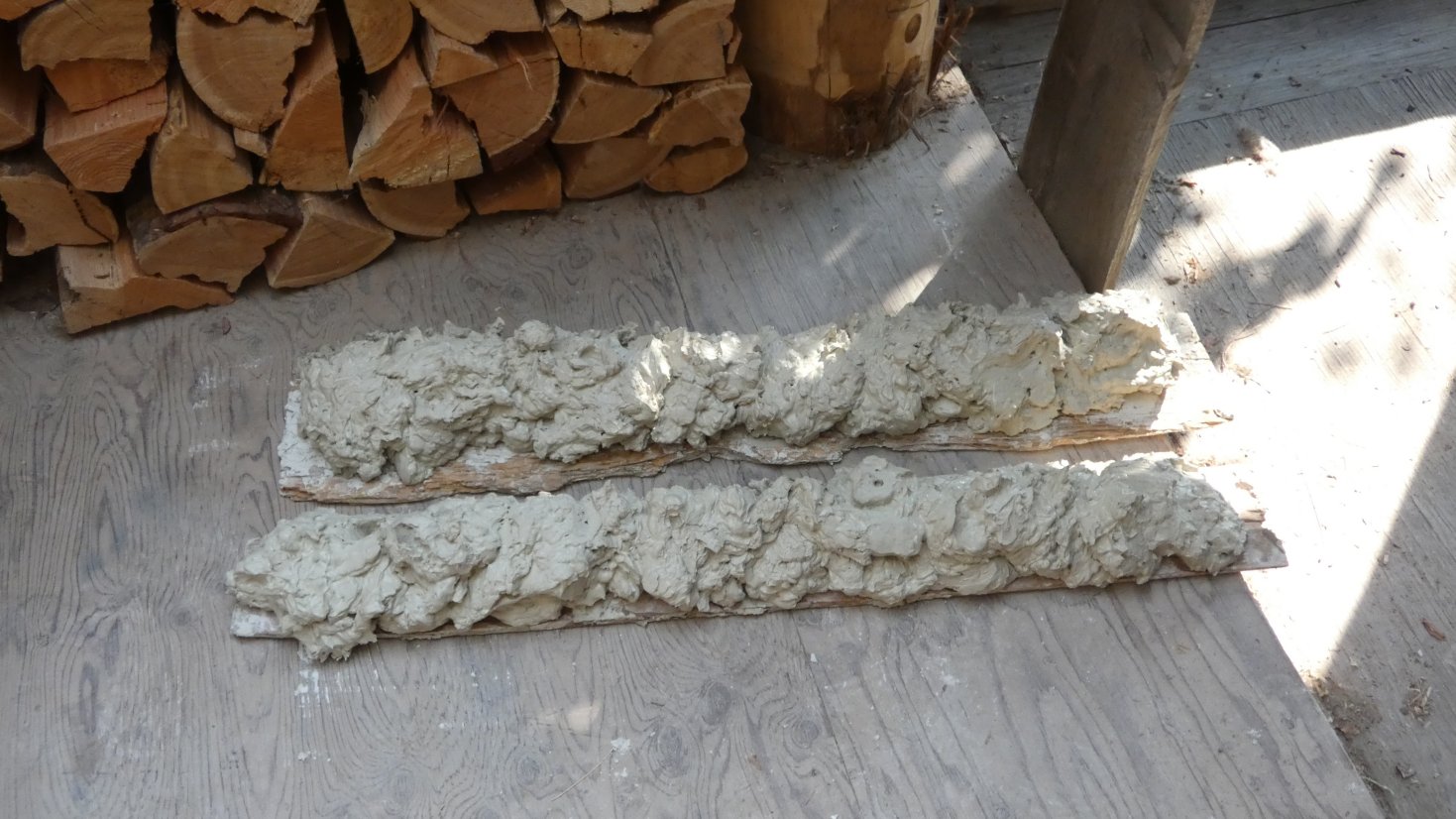
There is about 30 lbs on each board, drying outside until it stiffens enough to go through the pug mill.
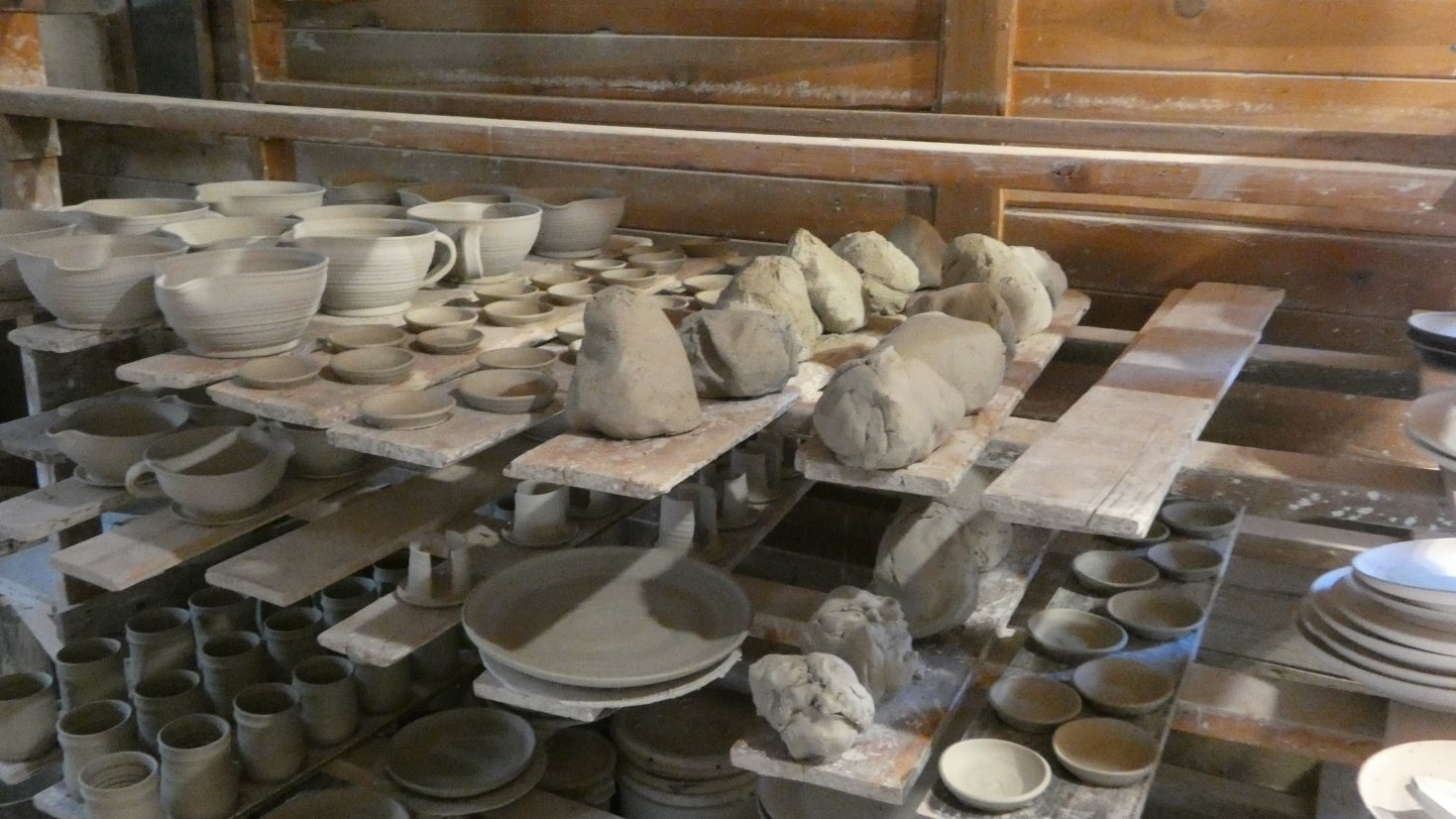
After
going through the pug mill, the tubes of clay are stood up like
rainbows on the ware boards, until they can be hand wedged to let them
evenly dry to suited throwing quality. All the pots in the photo
except the batter bowls are made from the new clay.
Unfortunately, because of the private location, no more clay will be available at the conclusion of the project.
Sept. 18th
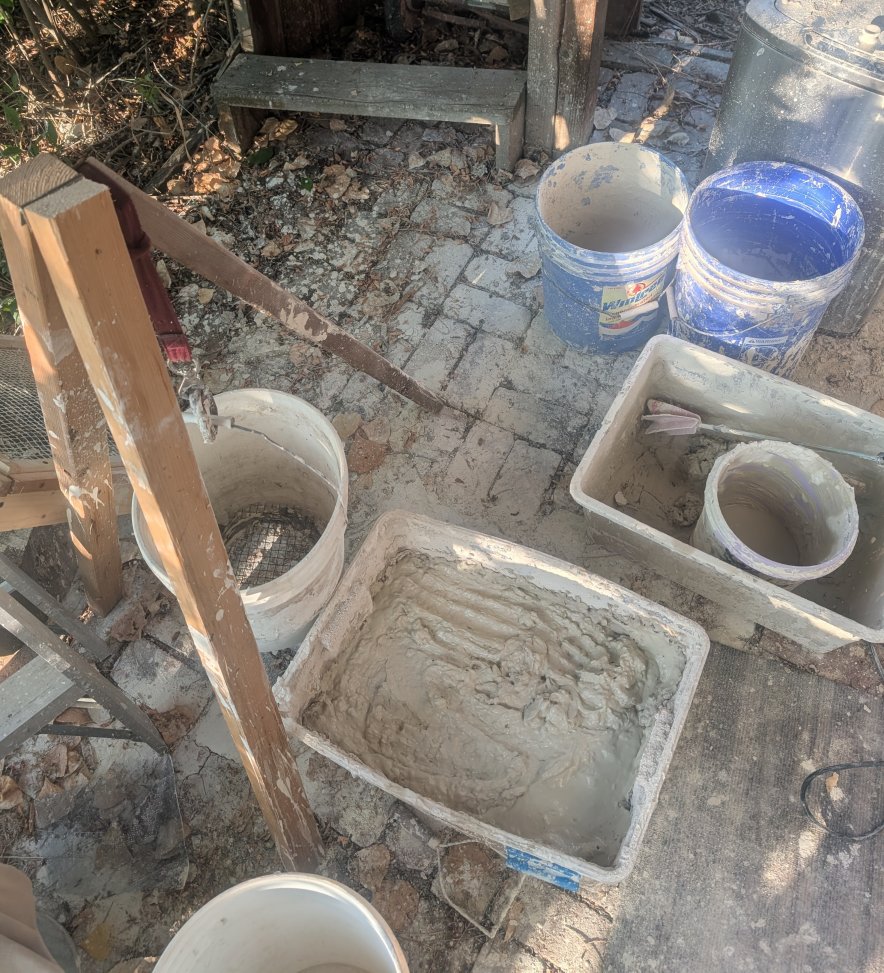
Here's
my current claymaking setup: the tripod has hinges so you can
raise it higher by moving the legs in. The bucket, with screening
and hardware cloth support for the screen, is suspended from the middle
of the tripod. It would be placed over the plastic bin while
running the drill mixer to encourage flow through the sieve. Here
are the steps I currently think are necessary for good results:
1.
Do weight tests with wild clay to determine firing range and porosity,
and to test other additions to improve it. (in my case the firing range
was good from Cone 6-8, but it was too fragile and inplastic so I added
varying amounts of ball clay, settling on 25% by weight). I'm
still considering adding grog to improve internal cohesion, after some
handles cracked neatly in half while drying). When the batch
recipe is decided on:
2. Weigh the wild clay (60 lbs wild to 20 lbs ball clay in my instance)
3.
Rough screen the clay when adding to the bin, breaking up
anything over one inch in diameter and removing obvious rocks and roots.
4.
Slake with water, allowing time for it to saturate the clay.
Stirring in the water is necessary, but excess stirring can
result in a thick slurry that will not wet the lumps.
5.
Transfer the slurry to another bin, with the bucket sieve keeping
out most of the impurities, assisted by the drill mixer.
6. Add dry powered additon (ball clay) at this stage, which makes the slurry considerably stiffer.
7.
Transfer to boards (some potters use plaster--I avoid it due to
potential lime popping). and air dry until wedge-able.
When it's thick enough I use my pugmill to get it uniform, but this can
also be achieved by wedging.
When it is wedge-able, it can be set on
boards in the conch shape of spiral wedging, or stretched out along the
board, or set in hoops to increase air exposure.
Making a batch
of 80 lbs dry clay with this process takes about 1/2 hour.
Because I can throw over 150 lbs per day, I plan to increase the
size of batches to 1000 lbs using a horse trough and foot stomping.
We have cold winters and I'm hoping to get a roof built over the
clay mixing area but it may be spring before mixing larger quanities is
feasible...
Sondahl blog index




















